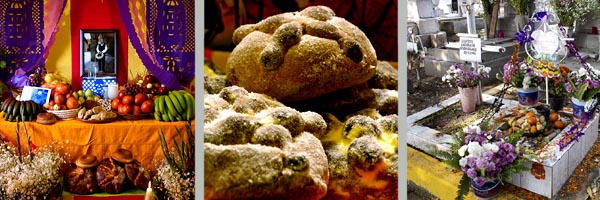 |
| A calavera |
Click to see Vol. I, Issue 1 of the newsletter in which this article first appeared.
Listen to the audio of this article!
For a better understanding of this article, read about the Great Wheel of the Year here.
When Christianity arrived in Europe, it took over this ancient custom of recognizing the dead who had gone before. On November 1, Christian practice restricts this observance to deceased (and sometimes living) Christians, and calls it "All Saints' Day." The following day, November 2, is for all of those who are gone; it's called "All Souls' Day."
Our own Hallowe'en is the eve or "even[ing]" (shortened to e'en) of All Saints', which is also called All Hallows ("hallow" being related to "holy," which is what saints are supposed to be). So the name "All Hallows' Evening" lost some pieces and became "Hallowe'en." The tradition of "Trick or Treat" follows customs from the days when people felt they needed to appease the spirits of the dead, lest misfortune befall them.
In Mexico, this celebration of the dead has taken on a decidedly festive air. When Mexican families and friends gather to remember their loved ones, they may assemble food and other offerings (called ofrendas) on altars, and themselves consume good things to eat, especially sweets like skulls made of sugar (called calaveras, meaning simply "skulls"). People also enjoy a kind of pastry called pan de muerto, or "bread of [the] dead," decorated with dough in the shape of skulls or crossbones.
So far, nothing here seems quite out of the ordinary. But here's a surprise: celebrations often take place in the cemetery where loved ones are buried! Family and friends will set up altars near the grave and "join" the departed, drinking and picnicking with them, sometimes even staying all night!
So this "day of the dead" is a time of reunion and good times for the living, too!
 |
| A home altar; pan de muerto; an ofrenda in a cemetery |
VOCABULARY ACTIVITIES
Everyday Words: Place the words below in the correct sentence. Use a dictionary to look up words you're not sure of. Answers are in the first comment below.
- A solar eclipse is one of the most amazing ________ events I've seen.
- Jack is older than Mary by three months; they were born in March and June ________.
- Loss of a loved one is the saddest thing that may ________ us.
- According to my ________, I will be able to retire in six more years.
- Don't play with fire ________ you get burned.
- I like to dress up for ________ occasions.
- After a loved one is ________ he or she may still live on in our memories.
- Once the bus has ________, the office cannot sell any more tickets.
- Communication these days is ________ different from the past.
- I brought donuts to work to ________ my boss for being late.
- appease
- befall
- celestial
- deceased
- decidedly
- departed
- festive
- lest
- reckoning
- respectively
--------
Specialized Words: Match the words to their meaning. Answers are in the first comment below.
- altars
- calaveras
- Dia de los Muertos
- equinoxes
- offerings
- ofrendas
- pan de muerto
- Samhain
- skull and crossbones
- solstices
- "bread of the dead"
- a design like the one on a pirate flag
- things given to the spirits of the dead
- an old word for Hallowe'en
- places for religious activities
- "Day of the Dead"
- longest and shortest days of the year
- "offerings"
- skulls, including those made of sugar
- points in the year when the day and night are the same length
QUESTIONS
Answer the following questions in your own words. Suggested answers are in the first comment below.
- What happens at the winter solstice? What happens at the summer solstice? What happens at the equinoxes?
- What happens (in some traditions) on the cross quarter days?
- What was the significance of Samhain?
- What is the difference between All Saints' Day and All Souls' Day?
- What are some things people might do on the Day of the Dead?


Answers to the Activities
ReplyDeleteEveryday Words: 1. c; 2. j; 3. b; 4. i; 5. h; 6. g; 7. d; 8. f; 9. e; 10. a
Specialized Words: 1. e; 2. i; 3. f; 4. j; 5. c; 6. h; 7. a; 8. d; 9. b; 10. g
Questions (suggested answers; yours may be slightly different)
1. The winter solstice has the longest night and the shortest day. The summer solstice has the longest day and the shortest night. The equinoxes have days and nights of equal lengths.
2. In some traditions, the seasons begin on the cross quarter days.
3. Samhain was the night before the start of winter, a time when the veil was thin between the worlds of the living and the dead.
4. All Saints' Day celebrates deceased Christians; All Souls' Day remembers all who have died.
5. On the Day of the Dead, people might set up altars for the deceased, eat candy shaped like skulls and pan de muerto, or go to the cemetery for an all-night "picnic" with their departed loved ones.